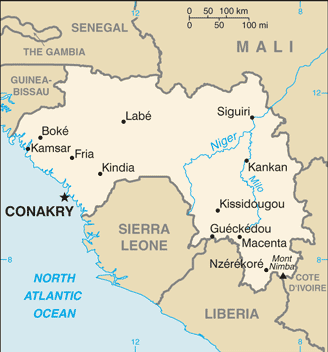Guinea

The Republic of Guinea has an estimated population of 10,3 million (UN, 2010). The capital is Conakry. Guinea has an area of 245,857 sq km (94,926 sq miles). The main languages are French, Susu, Fulani, and Mandingo.
Guinea became independent in 1958 from France. Despite being rich in natural resources and one of the world's biggest bauxite exporters, Guinea is one of the poorest countries in the west Africa due to bad governance and widespread corruption. In September 2009, Guinea made headlines when the army killed an estimated 150 people who were protesting against the military regime. The International Criminal Court has classified the case as a crime against humanity.
The constitution of Guinea grants equal rights to men and women as a fundamental right. However, discrimination against women still persists in the daily life, mainly in rural areas. Female genital mutilation (FGM) is widely practiced. During the political demonstration in September 2009, women were sexually assaulted and brutally raped by the army.
- Guinea signed the Protocol to the African Charter on Human and Peoples' Rights on the Rights of Women in Africa (The Maputo Protocol) on the 16th of December 2003 but has not ratified it.
- The Convention on the Elimination of All Forms of Discrimination against Women (CEDAW) was ratified by Guinea on the 9th August 1982.
- Guinea has not adopted yet a National Action Plan on United Nations Security Council Resolution 1325 (UNSCR 1325).
- There are no current or former UN peacekeeping mandates in Guinea.
